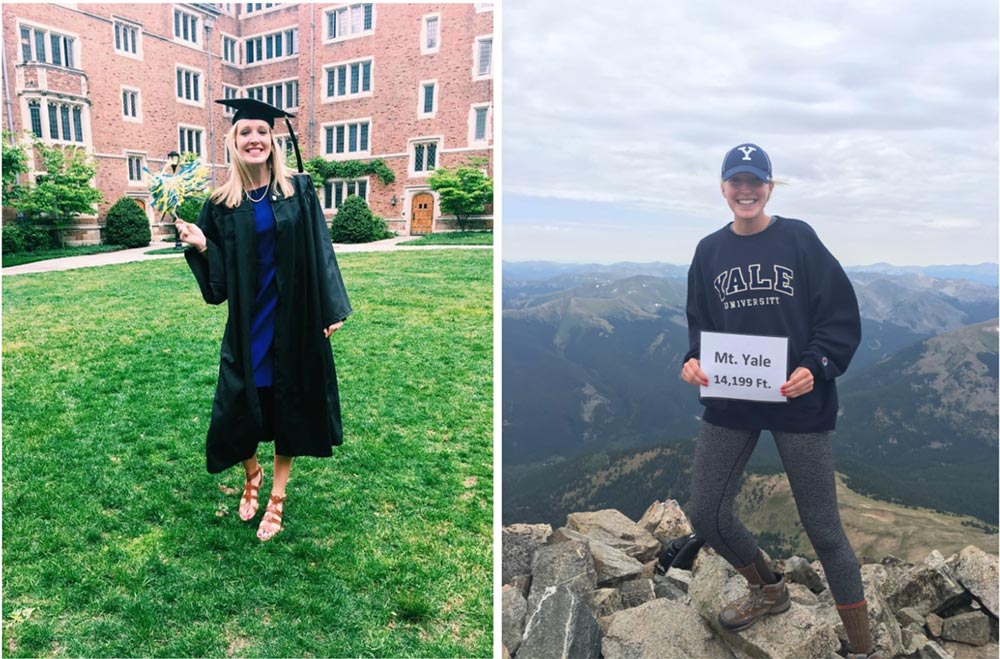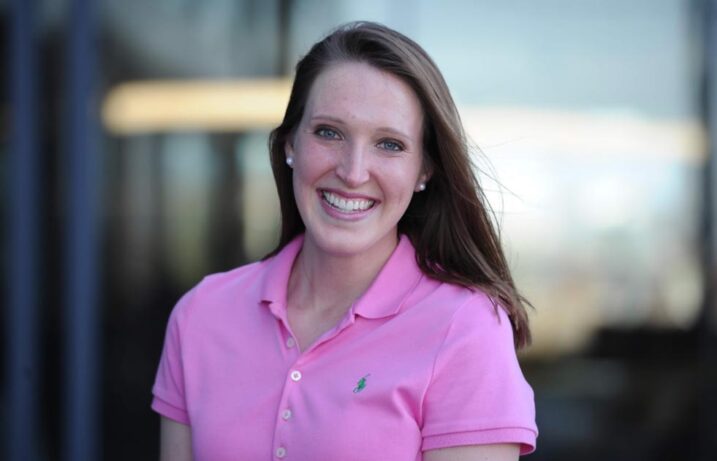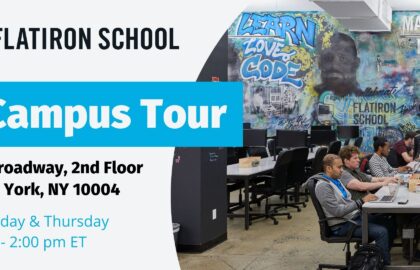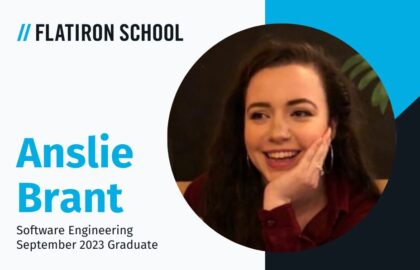UPDATE: Lillian accepted a job offer and is now a Front End Software Engineer at Talagent Financial in Boulder, CO
Let’s face it. Job hunting has always required persistence and consistency, but throw a pandemic into the mix and it now requires some added creativity.
We’ll be chatting with our students to learn more about their journey into tech and how they’re hunting for work during these times – and we can’t wait to see what they do next.
Meet Lillian Bitner!
What Flatiron program did you graduate from?
Software Engineering immersive program in Denver, CO (Jan 2020-April 2020)
What brought you to Flatiron in the first place?
I majored in Molecular Biology at Yale University, and completed postgraduate work as a cancer researcher at Memorial Sloan Kettering Cancer Center in NYC with the intent of going to medical school – but for a multitude of reasons this wasn’t the right path for me.
I quit my job, moved back to Colorado (where I am from) and began to figure out the next step. Many people (mentors and friends) encouraged me to pursue Software Engineering because of my science background and goal/motivation to make a positive impact, and I came across Flatiron School in Denver. With its amazing reputation and mission aligning well with mine, I decided to take a chance on myself and I began this past January!

What are your career goals?
Short term, I am simply looking for an opportunity to continue to learn and grow as a developer, be exposed to new technologies and industries, and would like to work in a highly collaborative environment.
Long term, I want to be a part of a company with a very positive mission. Although my background is in healthcare, I am open to exploring new industries and potential ways to make a positive impact.
What is a recent project you have been working on?
I have been interviewing and completing take-home code challenges which have been taking up the majority of my time. But when not doing those, I have been working on my portfolio site, mainly focusing on improving my design skills.
What’s one thing you’ve learned on this journey to code?
The largest lesson I have learned is to not only be okay with failure but to embrace failure. Software Engineering is so much about failing, learning from failure, and trying again. This mentality is not always perpetuated in our educational system or workforce for certain industries, and when I removed my fear of failing, I began trying new things, feeding my curiosity, and becoming a programmer!
What have you learned from your Career Coach? How have they been helpful?
My career coach has been unbelievably supportive and guiding throughout this entire process. The most important advice Matylda has given me is to network in every way possible. At first, I thought the only effective way to get a job was to complete an enormous amount of applications through postings on job boards. However, what she emphasized is that the majority of jobs are not posted, and it is important to make connections and friends in the industry so that you may be referred for a position, without the hassle of an application. I embraced this advice, and sent out email after email, to people who work for companies I am interested in or have already applied to, to people who wrote an interesting blog post I read, or to those I met at a tech meetup or event. Ultimately, this amount of emailing and messaging either led to no response (which is no big deal), a follow-up response that turned into a virtual friendship, or even a few responses that led to phone-calls and interview opportunities! Take chances, be bold, and make friends!
What’s it been like going through this experience during COVID-19?
I believe the job seeking process is always difficult no matter the circumstance, but during a global pandemic, with many hiring freezes and extreme economic distress, it certainly has been made even more difficult. I believe that with these circumstances, it is absolutely imperative to network and make connections within the tech industry, because less job postings might be posted, and the postings will be more highly sought after. Additionally, the interviewing process has been entirely virtual for companies which provides pros and cons: One pro is that you need only worry about your appearance from the shoulder up (so sweatpants are acceptable). However, the fact that you cannot make an in-person impression, or see the office space, limits the information you and the interviewer can gather. This change is entirely new for everyone in the world, so it helps to know that you are not alone, and that Flatiron School has an immense support system (career services, instructors, and classmates).
Any words of encouragement for fellow job seekers?
Job searching is inevitably very difficult, but there are a few lessons I have learned pretty quickly that have really helped me:
Never rule yourself out! I have applied to positions that require 10+ years experience or jobs that require technologies that I have never worked with. And of course I have been rejected from many, but I have also received many responses along the lines of “we are not sure you are a good fit for this position, but we will be/are hiring these other positions that you would be a great fit for – let me refer you.’ Just by being bold, and ignoring the requirements section of a job, I landed three interviews with companies I am really excited about!
Rejection is normal, inevitable and likely. Whether its rejection from the initial application, rejection in the sense that you never heard back from someone you emailed or direct messaged on LinkedIn, or rejection after 4 rounds of interviewing with a company – although it is so easy to take it personally, it is all part of the process and allows you to grow, learn, and take on the next application/interview with greater confidence.
UPDATE: Lillian accepted a job offer and is now a Front End Software Engineer at Talagent Financial in Boulder, CO!
“I currently work as a frontend focused software engineer at Talagent Financial, based out of Boulder, CO!
The interview process with Talagent was particularly unique because the process not only lasted about 10 days (from application response to offer letter), but it was also a process that accounted for and valued my potential as a developer as opposed to my current stack of knowledge post-bootcamp. The conversations with engineers and other company leaders led me to believe they viewed my application holistically, and appreciated the unique background and perspective I bring coming from health sciences.
The past 6 weeks of work has been a period of immense growth as an engineer, just as the Flatiron School program was. The transition to production code is far from trivial, but it is very fulfilling to be working on a team, towards a greater end goal!”




